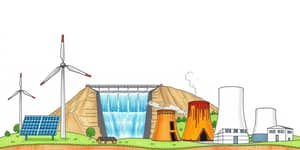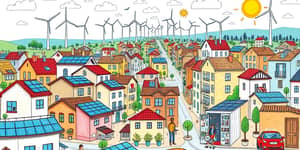In a world increasingly shaped by intensifying weather events, melting ice caps, and shifting ecosystems, many individuals find themselves grappling with a deep sense of unease. This emotional response, often termed climate anxiety or eco-anxiety, encompasses a range of feelings that can interfere with daily life. As awareness of environmental degradation grows, so too do the psychological impacts, leading to a collective strain on mental health. Understanding the roots of these concerns and discovering practical strategies for coping is essential.
At its core, climate anxiety involves ongoing distress about environmental changes and their potential consequences. People experiencing this phenomenon may feel overwhelmed by news reports, social media coverage, or personal observations of ecological harm. Recognizing these experiences as valid emotional responses paves the way for constructive action and meaningful support structures.
Defining the Scope of Climate Anxiety
Climate anxiety represents a spectrum of emotional and cognitive reactions to environmental threats. Some individuals report a heightened sense of dread when contemplating the future, while others experience guilt about not doing enough to protect the planet. This condition is also described using terms like “eco-grief” and “climate doom,” reflecting the multifaceted nature of the experience.
Individuals may feel feelings of doom and hopelessness or deep guilt about perceived inaction. Experts note that these reactions often arise from a clash between the scale of global challenges and our individual capacity to address them. When the magnitude of natural disasters, biodiversity loss, or rising sea levels feels insurmountable, anxiety can take hold.
Recognizing Symptoms and Manifestations
Climate anxiety can manifest through a combination of emotional, psychological, and physical symptoms. Identifying these signs early allows individuals to seek appropriate support and implement coping strategies before the distress becomes disabling.
In severe cases, these symptoms may disrupt work, education, or personal relationships. For some, the fear of environmental collapse can lead to self-isolation or a refusal to engage with news and community discussions. Yet, avoiding these topics may exacerbate feelings of powerlessness over time.
Prevalence and Impact on Youth
Recent studies reveal alarming statistics about the prevalence of climate anxiety, particularly among young people. According to a global survey published in Lancet Planetary Health, a majority of individuals aged 16 to 25 report significant worries about the future of the planet.
- 60% of those aged 16–25 are “very worried” about climate change
- Nearly 50% state these concerns affect their daily functioning
These figures highlight how environmental concerns are not abstract for many youths—they directly influence academic performance, social engagement, and overall well-being. The interplay between personal aspirations and looming ecological threats creates a tension that demands attention from educators, policymakers, and mental health professionals alike.
Exploring Root Causes and Stressors
Several factors contribute to the development of climate anxiety, ranging from direct experiences to broader societal influences. Understanding these elements can guide targeted interventions and community-based solutions.
- Firsthand exposure to extreme weather events such as floods, wildfires, or hurricanes
- Intensive media coverage amplifying the perceived severity and frequency of disasters
- Perceived intergenerational injustice and mistrust in leadership to address environmental threats
- Uncertainty about future stability and the potential for ecological collapse
Media outlets often sensationalize environmental crises, inadvertently fueling fear and distress. At the same time, communities lacking robust infrastructure or resources experience compounded stress when recovery from disasters is slow or inadequate. These cumulative pressures can deepen feelings of vulnerability.
Broader Mental Health and Societal Implications
Environmental stressors not only impact individuals but also shape community dynamics and societal stability. Research indicates that communities facing repeated natural disasters see higher rates of post-traumatic stress disorder, depression, and substance use.
In regions where resources are scarce, marginalized populations are disproportionately affected. Limited access to mental health services, emergency support, and financial safety nets exacerbates the psychological toll. Moreover, rising temperatures have been linked to increased aggression and social conflict, underscoring the need for comprehensive approaches that address both ecological and human well-being.
How Can We Manage Climate Anxiety?
Transforming anxiety into constructive energy involves a combination of personal strategies, collective action, and, when necessary, professional support. By embracing an integrated approach, individuals can regain a sense of purpose and resilience in the face of environmental uncertainty.
Personal Coping Mechanisms
Practice mindfulness and intentional self-care routines to cultivate emotional balance. Techniques such as meditation, deep breathing exercises, and journaling can help individuals observe their thoughts without judgment.
Validating feelings about environmental issues is equally important. Acknowledging emotions prevents internalization and helps build a foundation for proactive engagement rather than avoidance or despair.
Empowerment Through Action
Tangible steps to mitigate climate change can restore a sense of agency and hope. Whether reducing personal energy consumption, adopting a plant-based diet, or choosing sustainable transportation options, practical steps to reduce carbon footprint foster optimism.
- Implementing small but impactful lifestyle changes to reduce carbon emissions
- Joining local environmental initiatives and community resilience projects
- Creating household emergency plans and essential supply kits
Collective efforts amplify individual contributions. Working alongside neighbors to plant trees, organize neighborhood cleanups, or enhance urban green spaces nurtures solidarity and shared purpose.
Advocacy and Policy Engagement
Policy advocacy offers another avenue to channel climate anxiety into systemic change. Participating in campaigns, attending town halls, or engaging with elected representatives raises public awareness and pressures decision-makers to act. While policy shifts can be gradual, sustained civic involvement ensures that environmental concerns remain a top priority.
Seeking Professional Support
When anxiety becomes overwhelming, professional assistance can be invaluable. Therapists and counselors familiar with eco-anxiety provide frameworks for managing distress and developing resilience. Cognitive-behavioral approaches, in particular, can help reframe catastrophic thinking and build coping skills.
For communities with limited access to mental health resources, peer support groups and online forums offer alternatives. Sharing experiences in a compassionate environment reinforces the knowledge that individuals are not alone in their concerns.
Toward a Hopeful Future
While the challenges posed by climate change are daunting, collective awareness and action can drive meaningful progress. Recognizing climate anxiety as a valid response marks the first step in transforming worry into determination. Through individual resilience, community solidarity, and policy innovation, it is possible to build a more sustainable and emotionally supportive world for generations to come.
By integrating self-care with actionable solutions, we not only address our inner turmoil but also contribute to tangible environmental improvements. In doing so, we nurture both our planet and our mental well-being, ensuring that hope remains a guiding force in uncertain times.
References
- https://health.clevelandclinic.org/climate-anxiety
- https://sustainability.yale.edu/explainers/yale-experts-explain-climate-anxiety
- https://www.unicef.org/parenting/mental-health/climate-anxiety
- https://www.iberdrola.com/social-commitment/what-is-ecoanxiety
- https://mhanational.org/resources/coping-with-climate-anxiety/
- https://neurostimtms.com/climate-anxiety-2025/
- https://www.headspace.com/stress/climate-anxiety
- https://public-health.uq.edu.au/article/2023/03/%E2%80%98climate-anxiety%E2%80%99-clinical-diagnosis-should-it-be










